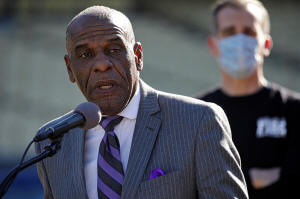|
Dozens of demonstrators arrived to support the measures proposed
by Senator Steven Bradford late Saturday, the last day of the
State Assembly session. The bills were moved to the inactive
file shortly before the session ended.
Earlier last week, a bill on land restitution that is part of
the package passed 56-0. It was unclear how that measure could
be implemented without the other two - one creating a fund and
the third an agency to determine matters such as who would be
eligible for reparations.
The "Sacramento Bee" quoted sources as saying that Governor
Gavin Newsom’s administration proposed dropping the implementing
agency but setting aside $6 million for university researchers
to study reparations and recommend a way to determine
eligibility.
The changes would have “removed the substance of what we were
trying to do,” Bradford, a Democrat, told Reuters, adding that
the administration had expressed “fiscal concerns.”
Newsom, a Democrat who has expressed support for reparations
legislation broadly, in July set aside $12 million for
reparations initiatives. A recent government analysis projected
the cost of the agency Bradford proposed to be between $3
million and $5 million.
Newsom’s office would not comment.
The agency Bradford proposed would have been in charge of
implementing the recommendations of the California Reparations
Task Force, which spent two years studying the state’s history
of slavery and subsequent decades of racial violence, political
disenfranchisement and racially exclusionary legislation.
According to a task force report, between 500 and 1,500 enslaved
African Americans lived in California during the Gold Rush in
the 1840s and 1850s, although slavery was illegal in the state.
“Everyone assumed the bills were going to be brought to vote,”
Kamilah Moore, lawyer and former chair of the task force told
Reuters. “Internal divisions got in the way.”
The legislature did pass eight other bills which were part of a
separate reparations package presented by the Black Caucus,
which included measures against discrimination of natural
hairstyles and requiring grocery stores in under-served
communities to notify the state if they plan to close.
Newsom has until the end of the month to sign the bills into
law.
(Reporting by Michela Moscufo; editing by Donna Bryson and Mark
Porter)
[© 2024 Thomson Reuters. All
rights reserved.]
Copyright 2022 Reuters. All rights reserved. This material may
not be published, broadcast, rewritten or redistributed.
Thompson Reuters is solely responsible for this content.

|
|




